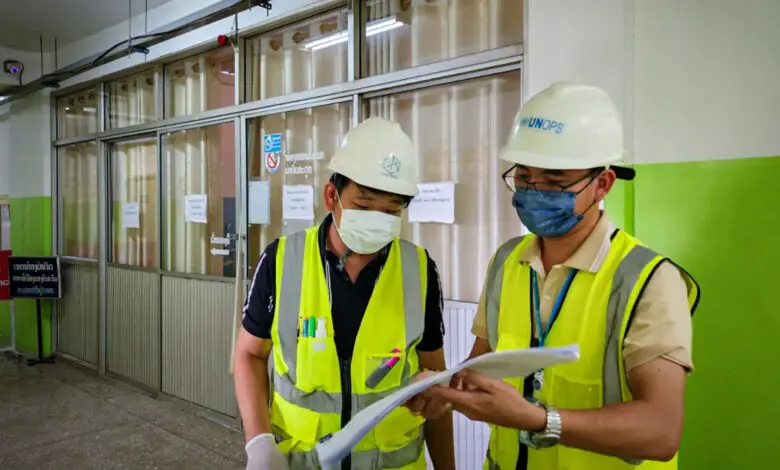UNOPS is recruiting for a Home based Capacity Building Specialist (Multiple positions)

Closing Date: 6 November 2024
UNOPS is recruiting for a Home based Capacity Building Specialist (Multiple positions)
Background
UNOPS supports partners to build a better future by providing services that increase the efficiency, effectiveness and sustainability of peace building, humanitarian and development projects. Mandated as a central resource of the United Nations, UNOPS provides sustainable project management, procurement and infrastructure services to a wide range of governments, donors and United Nations organizations. The New York Portfolios Office (NYPO) supports the United Nations Secretariat, as well as other New York-based United Nations organizations, bilateral and multilateral partners in the delivery of UNOPS mandate in project management, infrastructure management, and procurement management.
The Sustainable Development Cluster (SDC) supports diverse partners with their peacebuilding, humanitarian and development operations. It was formed by combining the following portfolios: Grants Management Services (GMS), UN Technology Support Services (UNTSS), Development and Special Initiatives Portfolio (DSIP) It provides Services to partners’ programmes that are designed, structured, and managed with a global perspective and primarily serving partners that are headquartered in New York. SDC has a footprint of approximately 125 countries.
UNOPS has signed an agreement with the United Nations Development Programme (UNDP) to implement the project activities for the Global Programme on Nature for Development. UNDP’s Global Programme on Nature for Development brings together three different initiatives — the Equator Initiative, and the National Biodiversity Initiative, and Learning for Nature under one program to identify, foster, showcase and celebrate nature-based solutions that help achieve the 2030 Agenda for Sustainable Development at local, national, and international levels.
The National Biodiversity Initiative supports countries to manage their ecosystems and biodiversity to improve national planning and governance of biodiversity and ecosystems, and to promote resilience for sustainable development. The initative’s GEF Enabling Activities work supports developing, middle income, and small island nations in their commitments to the Convention on Biological Diversity (CBD): early action on the post-2020 Global Biodiversity Framework, National Biodiversity Strategies and Action Plans (NBSAPs), National Reporting. The use of spatial data for spatial planning is an important cross-cutting theme across these project areas, including through UNOPS flagship platform UN Biodiversity Lab (UNBL) and to map Essential Life Support Areas (ELSAs).
The UNBL, created in partnership with UN Environment (UNEP) and the CBD Secretariat provides policymakers with access to 100 of the world’s best spatial datasets on nature, climate, and sustainable development for planning, monitoring, and reporting. Building on this base, UNOPS work to map ELSAs brings together the world’s best scientists and governments in 11 pilot countries to use spatial data to identify where nature-based actions to protect, manage, or restore ELSAs can deliver efficiently across national priorities for biodiversity climate, and sustainable development. A nascent area of work is building the spatial literacy of Indigenous peoples and local communities and ensuring their participation in spatial planning.
Learning for Nature is a capacity-building offer provided by the Global Programme on Nature for Development, cutting across the three areas of work. This programme connects biodiversity policymakers, change-makers, and on-the-ground subject matter experts to facilitate the delivery of the Convention on Biological Diversity’s Aichi Biodiversity Targets, and the achievement of the United Nations’ Sustainable Development Goals.
Building on UNOPS learnings on the ground, UNOPS seek synergies, build linkages, and engage thousands of course participants on their journey towards sustainable development solutions for people, nature, and resilient communities. Learning for Nature builds capacity to scale up efforts for nature-based sustainable development through Massive Open Online Courses (MOOCs), webinars, self-paced e-learning modules, podcasts, and private training courses.
The Capacity Building Specialist is a position to support a project which UNOPS is implementing for the United Nations Development Programme. The incumbent of this position will be personnel of UNOPS under its full responsibility.
Functional Responsibilities
Under the supervision of the Senior Technical Manager, the Capacity Building Specialist will support the National Biodiversity Initiative’s work to engage with governments and key international stakeholders on biodiversity, climate, and development-related policies and technical guidance. This program supports developing, middle income, and small island nations in their commitments to the CBD, including early action on the post-2020 GBF, NBSAPs, and national reporting. Working in collaboration with UNEP, the CBD (Convention on Biological Diversity) Secretariat, and the GEF Secretariat, this project provides technical and financial support to GEF-eligible Parties to CBD (Convention on Biological Diversity).
CBD (Convention on Biological Diversity) Parties are currently being mobilized to take early action on the Global Biodiversity Framework (GBF) by focusing on four components: national biodiversity planning and alignment, policy frameworks, monitoring and reporting frameworks, and biodiversity finance. These components, among others that may emerge, are aimed at ensuring that CBD Parties have the technical and financial support they require to work towards a robust, fully resourced, NBSAP, including a strong monitoring system, that is fully aligned with the GBF.
Financial and technical support is provided through two pathways: first, grants made to Parties to undertake national actions, and second, a global coordination grant that will make it possible to provide technical services to ensure national actions are effective, efficient, inclusive, and of the highest technical standards. The project’s Technical Support Unit (TSU) is being administered in coordination with SCBD and UNEP across 140. The project is additionally responsible for administrating national work for the 69 countries that receive GEF funding, which are primarily located in Latin America and Caribbean, Eastern Europe, and Asia.
The Stakeholder and Capacity Building Coordinator will also support governments to mainstream their commitments to nature, including alignmnet across the CBD, UN Framework Convention on Climate Change, and 2030 Agenda for Sustainable Development 2030 Agenda, among others. The Mapping Nature for People and Planet project supports governments and other stakeholders to use spatial data in their biodiversity planning and monitoring with the purpose of ensuring policy coherence and the production of robust, science-based national biodiversity policies and NBSAPs. This person will also coordinate this work, and the implementation of other projects as they emerge.
Responsibilities include the following:
Technical tools, capacity building and policy coherence
- Convene national consultations, liaise with technical experts / government officials / other stakeholders to ensure policy coherence and the mainstreaming of nature-based policies
- Coordinate technical experts and policy makers project in select countries to apply technical tools and guidance that lead to greater policy coherence.
- Work with national counterparts to that technical standards for priority focal areas are streamlined in national policies, such as national biodiversity planning and alignment, policy coherence, monitoring and reporting frameworks, biodiversity finance, and spatial planning;
- Liaise with the Technical Specialists to provide feedback from the supported-countries and enhance technical guidance and its delivery accordingly
- Serve as the main focal point for participating countries, leading on the step-by-step implementation of the project, and liaising with the technical experts;
- Provide support in organizing e-learning and webinar opportunities, liasing with the Learning for Nature team;
- Develop technical guidance documents, tools, and training on biodiversity and policy.
- Develop reports and policy recommendations related to the targets in the emerging post-2020 Global Biodiversity Framework.
- Conduct literature reviews, knowledge management sessions, compilation of information, and gathering of data on topics pertinent to the projects.
- Develop capacity building material, such as webinars, online courses, identifying relevant topics, dates and speakers for webinars and online courses
Monitoring and Reporting:
- Coordinate monitoring of activities to measure progress made against expected results.
- Manage the monitoring of progress against agreed results frameworks and performance indicators.
- Gather information and prepare reports on progress of project implementation for internal needs and donors.
- Coordinate timely and quality reporting, including donor reporting.
- Identify and synthesize best practices and lessons learned that are directly linked to the implementation of the project and contribute to their global dissemination.
Promotional opportunities and event management
- Prepare conferences and trainings to engage countries to showcase successful case studies and achieved milestones;
- Serve as the primary focal point and liaise with technical and institutional partners involved in the conference, training or event;
- Coordinate the development of the agenda, mobilization of speakers, and content production
- Ensure logistics, including – but not limited to – interpretation, catering, room layout, and facilitation.
Monitoring and Progress Controls
The assignment is supervised by the Manager of the Global Programme on Nature for Development.
Education/Experience/Language requirements
Education
- An advanced university degree (Master’s degree or equivalent) preferably in international relations, sustainable development, engineering, environmental management/sciences, law, science, social/political science, business, management, and/or other relevant field with five (5) years of relevant experience is required; OR
- First level university degree (Bachelor’s or equivalent) with seven (7) years of relevant experience
Required Experience:
- Relevant experience is defined as experience on at least one of the following topics at a conceptual or practical level: international environmental policy, natural resource management, biodiversity/climate change; human/civil/indigenous/women’s rights; social entrepreneurship/impact investing; local economic development; civil society engagement and education.
Language:
- Fluency in English (read, write, speak) is required.
- Knowledge of additional UN languages is an advantage.
This is a home based position, the selected candidate will be working from home, it is required to follow the working hours in New York (9 a.m. to 5 p.m. EDT Monday through Friday).
Click Here To Apply
Follow Opportunities For Everyone on Social Media




